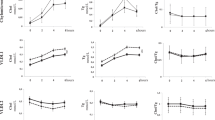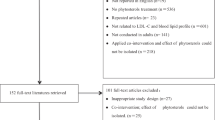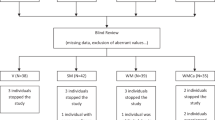Abstract
Objective: To investigate cholesterol-lowering effects of stanol ester (STAEST) and sterol ester (STEEST)-enriched margarines as part of a low-fat diet.
Design: According to a Latin square model randomized double-blind repeated measures design with three test margarines and three periods.
Setting: Outpatient clinical trial with free-living subjects.
Subjects: Thirty-four hypercholesterolaemic subjects completed the study.
Interventions: Subjects consumed three rapeseed oil-based test margarines (STAEST, STEEST and control (no added stanols or sterols)) as part of a low-fat diet each for 4 weeks.
Results: Mean daily intake of total plant sterols plus stanols was 2.01–2.04 g during the two test margarine periods. In reference to control, serum total cholesterol was reduced by 9.2 and 7.3% with the STAEST and STEEST margarine, respectively (P<0.001 for both). The respective reductions for low-density lipoprotein (LDL) cholesterol were 12.7 and 10.4% (P<0.001). The cholesterol-lowering effects of the test margarines did not differ significantly. The presence of apolipoprotein E4 allele had a significant effect on LDL cholesterol response during the STAEST margarine only. Serum sitosterol and campesterol increased by 0.83 and 2.77 mg/l with the STEEST (P<0.001), respectively and decreased by 1.18 and 2.60 mg/l with the STAEST margarine (P<0.001). Increases of serum sitostanol and campestanol were 0.11 and 0.19 mg/l with the STAEST margarine (P<0.001), repsectively. No significant changes were found in serum fat-soluble vitamin and carotenoid concentrations when related to serum total cholesterol.
Conclusions: STAEST and STEEST margarines reduced significantly and equally serum total and LDL cholesterol concentrations as part of a low-fat diet.
Sponsorship: Grant to the University of Kuopio by Raisio Benecol Ltd, Raisio, Finland.
European Journal of Clinical Nutrition (2000) 54, 715–725
This is a preview of subscription content, access via your institution
Access options
Subscribe to this journal
Receive 12 print issues and online access
$259.00 per year
only $21.58 per issue
Buy this article
- Purchase on Springer Link
- Instant access to full article PDF
Prices may be subject to local taxes which are calculated during checkout
Similar content being viewed by others
Author information
Authors and Affiliations
Contributions
Guarantor: MIJ Uusitupa.
Contributors: MAH was responsible for the study design, gave nutrition counselling, analysed and interpreted the data and wrote the manuscript. MIJU and ESS contributed to the planning of study design and diets, interpreting the data and writing the manuscript. HG analysed serum cholesterol precursors and plant sterols, and ATE analysed fatty acid composition of serum lipids and, in addition, both also contributed to interpreting the data and writing the manuscript.
Corresponding author
Rights and permissions
About this article
Cite this article
Hallikainen, M., Sarkkinen, E., Gylling, H. et al. Comparison of the effects of plant sterol ester and plant stanol ester-enriched margarines in lowering serum cholesterol concentrations in hypercholesterolaemic subjects on a low-fat diet. Eur J Clin Nutr 54, 715–725 (2000). https://doi.org/10.1038/sj.ejcn.1601083
Published:
Issue Date:
DOI: https://doi.org/10.1038/sj.ejcn.1601083
Keywords
This article is cited by
-
Phytosterol compositions of enriched products influence their cholesterol-lowering efficacy: a meta-analysis of randomized controlled trials
European Journal of Clinical Nutrition (2019)
-
Plasma fat-soluble vitamin and carotenoid concentrations after plant sterol and plant stanol consumption: a meta-analysis of randomized controlled trials
European Journal of Nutrition (2017)
-
Reduction of cardiac and aortic cholesterol in hypercholesterolemic rats fed esters of phytosterol and omega-3 fatty acids
Journal of Food Science and Technology (2015)
-
Cholesterol metabolism and serum non-cholesterol sterols: summary of 13 plant stanol ester interventions
Lipids in Health and Disease (2014)
-
Therapies Targeting Exogenous Cholesterol Uptake: New Insights and Controversies
Current Atherosclerosis Reports (2011)



